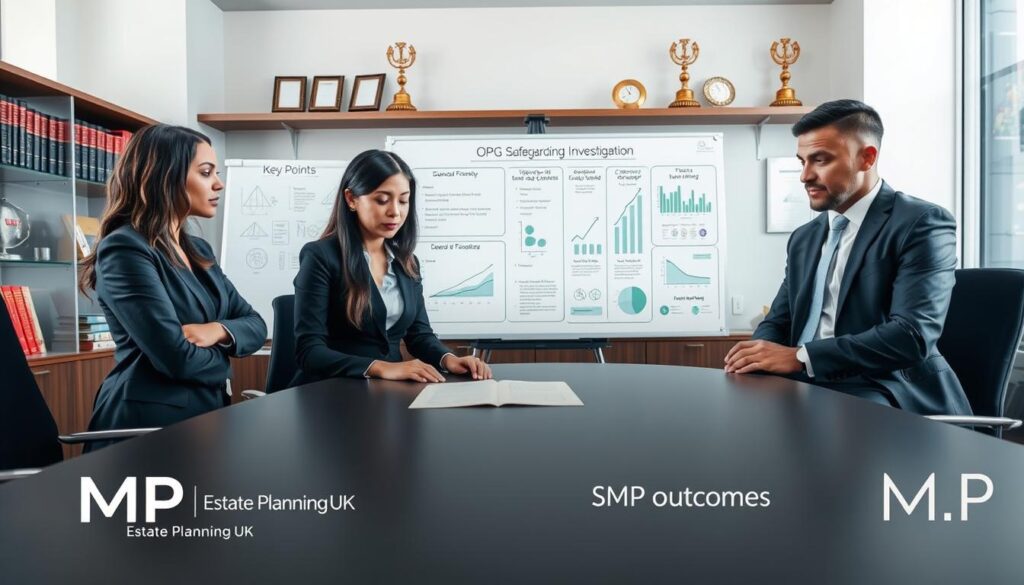Did you know that thousands of vulnerable adults in the UK are at risk of financial abuse every year? The Office of the Public Guardian (OPG) plays a crucial role in safeguarding adults who may lack mental capacity.
Concerns can be reported regarding the misuse of a donor’s money or decisions not in their best interests. We will explore the triggers and process of safeguarding investigations in the UK, providing expert guidance on protecting your family’s future.
Key Takeaways
- Understanding the role of the OPG in safeguarding vulnerable adults
- Recognising the triggers for a safeguarding investigation
- Knowing what to expect during a safeguarding investigation
- Learning how to report concerns about a donor’s welfare
- Protecting your family’s future through expert guidance
Understanding OPG Safeguarding Investigations
Understanding the role of the OPG in safeguarding investigations is essential for protecting vulnerable individuals. The Office of the Public Guardian (OPG) is an executive agency of the Ministry of Justice, responsible for safeguarding the interests of people who may lack mental capacity.
Definition of OPG
The OPG is a crucial organisation that supports people in planning ahead for their health, welfare, and financial decisions. It does this by registering lasting powers of attorney (LPAs) and enduring powers of attorney (EPAs), as well as supervising deputies appointed by the Court of Protection.
We work closely with other agencies to ensure that adults at risk are protected from abuse or neglect. The OPG’s role is not only to investigate concerns but also to provide guidance and support to attorneys and deputies.
Purpose of Safeguarding Investigations
Safeguarding investigations are conducted to protect adults at risk from abuse or neglect. The OPG’s primary concern is the well-being and safety of the individual. These investigations help to identify potential risks and ensure that appropriate measures are taken to mitigate them.
The purpose of these investigations is multifaceted:
- To identify potential abuse or neglect
- To assess the level of risk to the individual
- To take appropriate action to protect the individual
- To provide support and guidance to attorneys and deputies
By understanding the purpose and process of OPG safeguarding investigations, we can better appreciate the importance of this role in protecting vulnerable adults.
| Key Aspect | Description |
|---|---|
| Role of OPG | Safeguarding the interests of people who may lack mental capacity |
| Purpose of Investigations | Protecting adults at risk from abuse or neglect |
| Key Activities | Registering LPAs and EPAs, supervising deputies, investigating concerns |
Triggers for an OPG Safeguarding Investigation
The Office of the Public Guardian (OPG) initiates safeguarding investigations in response to various triggers that indicate potential abuse or neglect. Understanding these triggers is essential for recognizing when the OPG might intervene to protect vulnerable adults.
Signs of Financial Abuse
Financial abuse is a significant concern that can trigger an OPG safeguarding investigation. Signs of financial abuse include unusual or unexplained transactions, changes in power of attorney, and discrepancies in financial records. For instance, if a vulnerable adult’s bank statements show regular, unexplained withdrawals, this could raise red flags.
Vulnerable Adult Reports
Reports concerning the welfare of vulnerable adults can also prompt an investigation. These reports often come from concerned family members, healthcare professionals, or social services. Such reports are crucial as they can provide early warnings of potential abuse or neglect.
Changes in Circumstances
Changes in an individual’s circumstances, such as a sudden change in living arrangements or the appearance of new, influential individuals, can indicate potential neglect or abuse. These changes can sometimes signal that a vulnerable adult is being exploited or mistreated.
| Trigger | Description | Example |
|---|---|---|
| Financial Abuse | Unusual financial transactions or discrepancies | Unexplained withdrawals from bank accounts |
| Vulnerable Adult Reports | Concerns raised about an adult’s welfare | Reports from healthcare professionals about neglect |
| Changes in Circumstances | Sudden changes in living or financial arrangements | New individuals exerting control over a vulnerable adult’s finances |

By understanding these triggers, we can better identify situations where the OPG might need to intervene to protect vulnerable adults from abuse or neglect.
The Role of the OPG in Safeguarding
As a statutory body, the OPG is committed to protecting adults who may be at risk of abuse. The OPG’s role is multifaceted, involving the supervision of deputies appointed by the Court of Protection and ensuring that they act in the best interests of the individuals they represent.
Overview of the OPG Function
The OPG’s primary function is to safeguard individuals who have a deputy appointed to manage their affairs. This involves monitoring the actions of deputies to ensure they act in accordance with the Mental Capacity Act 2005. The OPG also provides guidance and support to deputies to help them understand their responsibilities and obligations.
The OPG’s work is guided by the OPG safeguarding policy guidelines, which outline the principles and procedures for safeguarding vulnerable adults. These guidelines are designed to ensure that the OPG’s actions are consistent with the legal framework for OPG safeguarding, which is rooted in the Mental Capacity Act 2005 and other relevant legislation.

Collaboration with Other Agencies
The OPG works closely with other agencies, including adult social services and the police, to investigate concerns and protect vulnerable adults. This collaborative approach is essential for effective safeguarding, as it enables the sharing of information and coordination of efforts to support vulnerable individuals.
By working together with other agencies, the OPG can ensure a comprehensive response to safeguarding concerns. This may involve joint investigations, sharing of best practices, and coordination of support services for vulnerable adults.
The legal framework for OPG safeguarding emphasizes the importance of interagency collaboration. The OPG’s work with other agencies is guided by the principles of safeguarding vulnerable adults in the UK, which prioritize the well-being and safety of vulnerable individuals.
The Investigation Process Explained
Upon receiving a safeguarding concern, the OPG initiates an investigation to ensure the well-being of the individual at risk. This process is crucial in determining whether abuse has occurred and what actions should be taken next.
Initial Assessments
The OPG begins with an initial assessment to understand the nature of the concern. This involves reviewing the information provided and identifying the key issues that need to be addressed.
The OPG may contact relevant parties, including the individual concerned, their family members, or healthcare professionals, to gather more information.
Gathering Evidence
Once the initial assessment is complete, the OPG proceeds to gather evidence. This can involve reviewing financial transactions, interviewing witnesses, and examining documents related to the individual’s affairs.
The OPG aims to complete investigations within 14 weeks, although complex cases may take longer. For more information on how the OPG deals with safeguarding concerns, you can visit the UK Government’s guidance page.

Outcomes of an OPG Safeguarding Investigation
The outcome of an OPG safeguarding investigation is crucial in determining the next steps for protecting vulnerable adults. When the investigation is complete, the OPG will have gathered sufficient information to make informed decisions about the necessary actions.

Possible Findings and Decisions
The OPG’s investigation may result in various findings, leading to different decisions. If the investigation confirms abuse or neglect, the OPG can take several actions. For instance, they might request that attorneys or deputies take specific actions to safeguard the individual. In more severe cases, the OPG may apply to the Court of Protection to make decisions regarding the donor’s or client’s welfare.
As stated by the Office of the Public Guardian, “The OPG’s role is to protect people who lack mental capacity from abuse, including financial abuse, and to make sure that their best interests are represented.”
“Safeguarding is everyone’s responsibility, and we work closely with other agencies to ensure that vulnerable adults are protected.”
In some instances, the OPG may decide to take no further action if they determine that the individual is not at risk or that adequate safeguards are already in place. The decision-making process is thorough and considers the welfare and rights of the individual concerned.
Recommendations for Protection
Based on the investigation’s findings, the OPG may also make recommendations to protect the vulnerable adult. These recommendations can include:
- Regular monitoring of the individual’s financial affairs
- Adjustments to the Lasting Power of Attorney (LPA) or deputyship arrangements
- Providing additional support or resources to the individual or their caregivers
These measures are designed to prevent future abuse or neglect and ensure that the individual’s needs are met. By taking a proactive and informed approach, the OPG plays a vital role in safeguarding vulnerable adults in the UK.
Rights of the Individuals Involved
Understanding the rights of those involved in an OPG safeguarding investigation is essential for a fair and just outcome. The legal framework for OPG safeguarding is designed to protect the rights of all individuals involved, ensuring that the process is conducted fairly and with respect for all parties.
Rights of the Alleged Victim
The alleged victim has several rights during an OPG safeguarding investigation. These include the right to be informed about the progress and outcome of the investigation, the right to have their privacy protected, and the right to receive support and protection from abuse. As stated in the OPG safeguarding policy guidelines, “the alleged victim should be treated with dignity and respect throughout the investigation process.”
“The welfare of the individual is paramount, and all actions taken must be in their best interests.”
The alleged victim also has the right to access information about the investigation, although this may be limited in certain circumstances to protect the integrity of the investigation or the rights of other individuals involved.
Rights of the Alleged Perpetrator
The alleged perpetrator also has rights during the investigation. These include the right to be informed about the allegations made against them, the right to respond to these allegations, and the right to a fair process. It is crucial that the alleged perpetrator is given the opportunity to present their side of the story and to challenge any evidence brought against them.
In accordance with the principles of safeguarding vulnerable adults in the UK, the rights of the alleged perpetrator must be balanced against the need to protect the alleged victim. This balance is critical to ensuring that the investigation is fair and that the outcome is just.

Both parties have the right to seek legal advice and representation during the investigation process. This is an important safeguard to ensure that their rights are protected and that they receive a fair hearing.
After the Investigation: Next Steps
The conclusion of an OPG safeguarding investigation marks the beginning of a new phase, where support for vulnerable individuals and potential legal actions come into play. We understand that the period following an investigation can be critical for those involved, and it’s essential to navigate this phase with care and clarity.
Support for Vulnerable Individuals
After an investigation, the OPG may provide or facilitate various forms of support for vulnerable individuals. This support is tailored to the specific needs of the individual and can include:
- Referral to social services for ongoing care and support
- Guidance on managing financial affairs, if applicable
- Assistance in making decisions about their living arrangements
We recognize that every individual’s circumstances are unique, and the support provided is designed to address their particular needs and ensure their well-being.

Legal Implications and Actions
In cases where the investigation reveals evidence of abuse or misconduct, the OPG may take legal actions to protect the vulnerable individual. This can involve applying to the Court of Protection to make decisions on behalf of the individual or to restrict the actions of the person responsible for the abuse.
For more information on protecting your family from power of attorney abuse, you can visit our resource page: Protecting Your Family from Power of Attorney.
The following table outlines some potential legal implications and actions that may be taken:
| Legal Implication | Potential Action |
|---|---|
| Financial Abuse | Application to the Court of Protection to freeze assets or appoint a new deputy |
| Neglect or Physical Abuse | Referral to adult social care for intervention and support |
| Misuse of Power of Attorney | Investigation by the OPG and potential legal action against the attorney |
We are committed to ensuring that vulnerable individuals receive the protection and support they need, and we are here to guide you through this process.
Reporting Suspected Abuse: How To
Reporting suspected abuse to the OPG is a vital step in protecting vulnerable adults. We understand that suspecting abuse can be distressing, but taking the right steps can help ensure the victim’s safety.
When it comes to reporting suspected abuse, it’s essential to know whom to contact and what information to provide. The OPG has a clear safeguarding policy in place, which outlines the procedures for reporting and investigating abuse. You can find more details on their policy in their official document available on the GOV.UK website: OPG Safeguarding Policy.
Whom to Contact
If you suspect someone is being abused, you should contact the OPG directly. They have a dedicated team to handle safeguarding concerns. You can reach them by:
- Calling their helpline: 0300 456 0300 (available Monday to Friday, 9:30 am to 5:00 pm)
- Emailing them through their official website
- Writing to them at their address: Office of the Public Guardian, PO Box 16185, Birmingham, B2 2WH
Necessary Evidence
When reporting suspected abuse, it’s helpful to have as much information as possible. This can include:
- The name and contact details of the person you believe is being abused
- Details of the abuse, including dates and times if known
- Any relevant information about the alleged perpetrator
- Your contact details, so the OPG can follow up with you if needed
Providing detailed information will help the OPG in their investigation and ensure that they can take appropriate action to protect the individual.
By reporting suspected abuse to the OPG, you are playing a crucial role in safeguarding vulnerable adults. We encourage anyone with concerns to come forward, as your actions can make a significant difference in protecting those at risk.
Common Misconceptions About Safeguarding Investigations
The reality of OPG safeguarding investigations is often misunderstood, leading to a lack of reporting and action. We need to address these misconceptions to ensure that vulnerable adults receive the protection they need.
Myths vs. Reality
Many myths surround OPG safeguarding investigations. Let’s examine a few:
| Myth | Reality |
|---|---|
| OPG investigations are invasive and traumatic. | While investigations can be stressful, they are designed to be as non-invasive as possible and prioritize the well-being of the individual. |
| Only family members can report concerns. | Anyone can report concerns, including healthcare professionals, friends, and neighbors. |
| OPG safeguarding investigations are only triggered by financial abuse. | While financial abuse is a significant trigger, investigations can also be initiated due to reports of physical, emotional, or neglectful abuse. |
Importance of Awareness
Raising awareness about the reality of OPG safeguarding investigations is crucial. It encourages individuals to report concerns without fear of misconstruing the process. Education on the safeguarding vulnerable adults in the UK and best practices for OPG investigations is key to protecting those at risk.
By understanding the truth about OPG safeguarding investigations, we can better support vulnerable adults and ensure that investigations are conducted effectively and compassionately.
Resources and Support for Individuals
Individuals affected by OPG safeguarding investigations can access various resources to help navigate the process. Understanding the legal framework for OPG safeguarding is crucial for those involved.
Guidance and Advisory Services
The Office of the Public Guardian (OPG) provides guidance on investigations, which can be a valuable resource for individuals seeking to understand the process. Advisory services can offer support and guidance on the steps to take during an investigation.
Legal Support Options
For those requiring legal assistance, there are various legal support options available. Reporting OPG safeguarding concerns can be a complex process, and seeking legal advice can help ensure that individuals understand their rights and obligations.
By accessing these resources and support services, individuals can better navigate the complexities of OPG safeguarding investigations.


